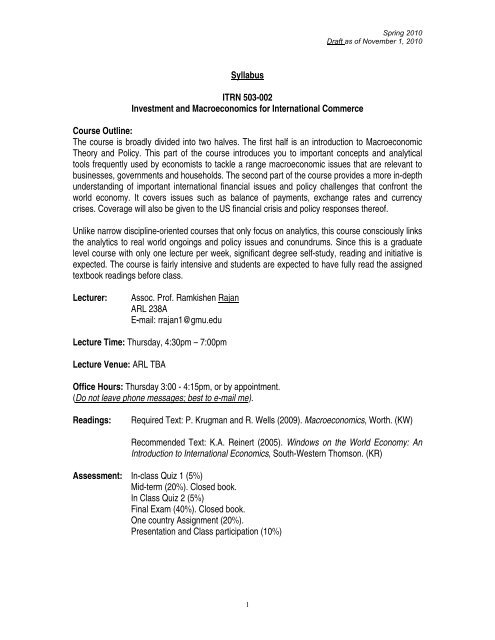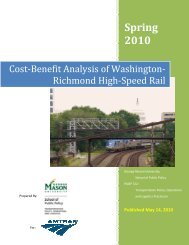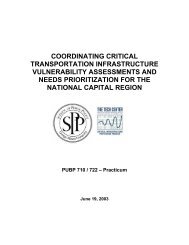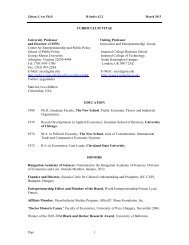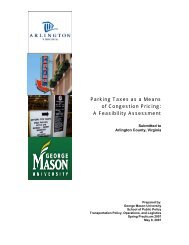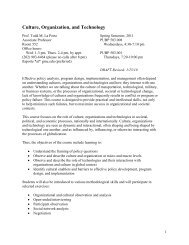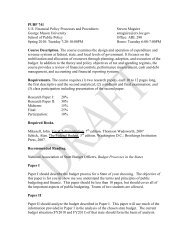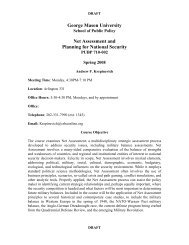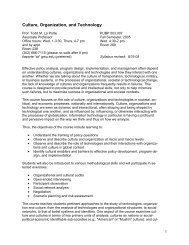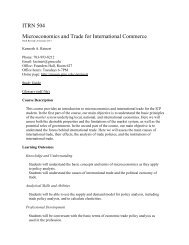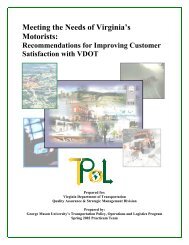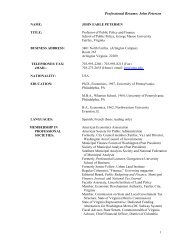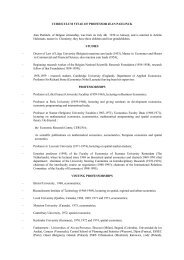ITRN 503-002 - George Mason University
ITRN 503-002 - George Mason University
ITRN 503-002 - George Mason University
Create successful ePaper yourself
Turn your PDF publications into a flip-book with our unique Google optimized e-Paper software.
Syllabus<br />
<strong>ITRN</strong> <strong>503</strong>-<strong>002</strong><br />
Investment and Macroeconomics for International Commerce<br />
1<br />
Spring 2010<br />
Draft as of November 1, 2010<br />
Course Outline:<br />
The course is broadly divided into two halves. The first half is an introduction to Macroeconomic<br />
Theory and Policy. This part of the course introduces you to important concepts and analytical<br />
tools frequently used by economists to tackle a range macroeconomic issues that are relevant to<br />
businesses, governments and households. The second part of the course provides a more in-depth<br />
understanding of important international financial issues and policy challenges that confront the<br />
world economy. It covers issues such as balance of payments, exchange rates and currency<br />
crises. Coverage will also be given to the US financial crisis and policy responses thereof.<br />
Unlike narrow discipline-oriented courses that only focus on analytics, this course consciously links<br />
the analytics to real world ongoings and policy issues and conundrums. Since this is a graduate<br />
level course with only one lecture per week, significant degree self-study, reading and initiative is<br />
expected. The course is fairly intensive and students are expected to have fully read the assigned<br />
textbook readings before class.<br />
Lecturer: Assoc. Prof. Ramkishen Rajan<br />
ARL 238A<br />
E-mail: rrajan1@gmu.edu<br />
Lecture Time: Thursday, 4:30pm – 7:00pm<br />
Lecture Venue: ARL TBA<br />
Office Hours: Thursday 3:00 - 4:15pm, or by appointment.<br />
(Do not leave phone messages; best to e-mail me).<br />
Readings: Required Text: P. Krugman and R. Wells (2009). Macroeconomics, Worth. (KW)<br />
Recommended Text: K.A. Reinert (2005). Windows on the World Economy: An<br />
Introduction to International Economics, South-Western Thomson. (KR)<br />
Assessment: In-class Quiz 1 (5%)<br />
Mid-term (20%). Closed book.<br />
In Class Quiz 2 (5%)<br />
Final Exam (40%). Closed book.<br />
One country Assignment (20%).<br />
Presentation and Class participation (10%)
2<br />
Spring 2010<br />
Draft as of November 1, 2010<br />
Important information on grading:<br />
I have high standards and in larger classes, it is unlikely (but by no means impossible) that more<br />
than 30 percent of the class will get an “A” or “A-” grade (i.e. sign of good performance in my<br />
class). Based on past history, the median grade is likely to be in the range of “B” or “B+”. Grades in<br />
this class have to be earned; they are not an entitlement and neither are they negotiable.<br />
Learning outcomes:<br />
Students will understand the basic concepts and terms of macroeconomics (such as growth,<br />
inflation) as they apply to policy analysis (such as monetary policy, fiscal policy, exchange rate<br />
policy). Students will understand the causes of economic growth, unemployment and inflation and<br />
issues impacting the effectiveness of monetary and fiscal policy, and be introduced to open<br />
economy topics like relating to capital flows and exchange rates.<br />
SPP Policy on Plagiarism:<br />
The profession of scholarship and the intellectual life of a university as well as the field of public<br />
policy inquiry depend fundamentally on a foundation of trust. Thus any act of plagiarism strikes at<br />
the heart of the meaning of the university and the purpose of the School of Public Policy. It<br />
constitutes a serious breach of professional ethics and it is unacceptable. Plagiarism is the use of<br />
another’s words or ideas presented as one’s own. It includes, among other things, the use of<br />
specific words, ideas, or frameworks that are the product of another’s work. Honesty and<br />
thoroughness in citing sources is essential to professional accountability and personal<br />
responsibility. Appropriate citation is necessary so that arguments, evidence, and claims can be<br />
critically examined. Plagiarism is wrong because of the injustice it does to the person whose ideas<br />
are stolen. But it is also wrong because it constitutes lying to one’s professional colleagues. From<br />
a prudential perspective, it is short-sighted and self-defeating, and it can ruin a professional career.<br />
The faculty of the School of Public Policy takes plagiarism seriously and has adopted a zero<br />
tolerance policy. Any plagiarized assignment will receive an automatic grade of “F.” This may<br />
lead to failure for the course, resulting in dismissal from the <strong>University</strong>. This dismissal will be noted<br />
on the student’s transcript. For foreign students who are on a university-sponsored visa (e.g. F-1,<br />
J-1 or J-2), dismissal also results in the revocation of their visa.<br />
To help enforce the SPP policy on plagiarism, all written work submitted in partial fulfilment of<br />
course or degree requirements must be available in electronic form so that it can be compared with<br />
electronic databases, as well as submitted to commercial services to which the School subscribes.<br />
Faculty may at any time submit student’s work without prior permission from the student. Individual<br />
instructors may require that written work be submitted in electronic as well as printed form. The<br />
SPP policy on plagiarism is supplementary to the <strong>George</strong> <strong>Mason</strong> <strong>University</strong> Honor Code; it is not<br />
intended to replace it or substitute for it. (http://www.gmu.edu/facstaff/handbook/aD.html)<br />
Special Needs:<br />
If you are a student with a disability and you need academic accommodations, please see me and<br />
contact the Disability Resource Center (DRC) at 993-2474. All academic accommodations must<br />
be arranged through the DRC.
Course Outline*<br />
Time Topic<br />
Week 1<br />
(Jan 21)<br />
Week 2<br />
(Jan 28)<br />
Weeks 3 and 4<br />
(Feb 4 and 11)<br />
Weeks 5 and 6<br />
(Feb 18 and 25)<br />
Week 7<br />
(Mar 4)<br />
Week 8<br />
(Mar 11)<br />
Weeks 9 and 10<br />
(Mar 18 and 25)<br />
Weeks 11 and 12<br />
(Apr 1 and 8)<br />
Week 13<br />
(Apr 15)<br />
Week 14<br />
(Apr 22)<br />
Week 15<br />
(Apr 29)<br />
Week 16<br />
(May 6)<br />
3<br />
Spring 2010<br />
Draft as of November 1, 2010<br />
Course Preliminaries and Introduction to<br />
Macroeconomics, Identities, Concepts, Definitions,<br />
Business Cycle and Growth<br />
Identities, Concepts, Definitions, Business Cycle and<br />
Growth<br />
Introduction to Aggregate Supply (AS) and Aggregate<br />
Demand (AD) Models<br />
Quiz 1 and Application to AS-AD: Fiscal Policy<br />
Mid-Term<br />
Spring-break<br />
Application to AS-AD: Monetary Policy<br />
Monetary Policy during the financial crisis and the<br />
Yield Curve<br />
Quiz 2 and External Dimensions of Macroeconomics<br />
External Dimensions of Macroeconomics<br />
Final Exam<br />
Assignment due<br />
This outline is subject to some alterations during the course of the semester.
Week 0: Basics<br />
Math refresher:<br />
http://www.stat.wisc.edu/~ifischer/calculus.pdf<br />
Required Readings<br />
Overview of US Macroeconomy<br />
http://federalreserve.gov/newsevents/speech/kohn20090420a.htm<br />
Week 1: Definitions and Concepts<br />
4<br />
Spring 2010<br />
Draft as of November 1, 2010<br />
Bergheim, Stefan, “Measures of Well-Being: There is more to it than GDP,” Deutsche Bank<br />
Research, 2006.<br />
http://www.dbresearch.com/PROD/DBR_INTERNET_EN-PROD/PROD00000000<strong>002</strong>02587.pdf<br />
Bernanke, Ben S., “The Benefits of Price Stability,” Speech at the Center for Economic Policy<br />
Studies, 2006.<br />
http://www.federalreserve.gov/boardDocs/Speeches/2006/200602242/default.htm<br />
Callen, Tim, “PPP Versus the Market: Which Weight Matters?,” Finance and Development. 44,<br />
2007.<br />
http://www.imf.org/external/pubs/ft/fandd/2007/03/basics.htm<br />
Callen. Tim “What is GDP?” December 2008.<br />
http://www.imf.org/external/pubs/ft/fandd/2008/12/basics.htm<br />
Claessens, Stjin and M. Ahyan Kose.”What is a Recession?”, Finance and Development, March<br />
2009.<br />
http://www.imf.org/external/pubs/ft/fandd/2009/03/basics.htm<br />
Mishkin, Fredric S., “Headline versus Core Inflation in the Conduct of Monetary Policy,” Remarks at<br />
the Business Cycles, International Transmission and Macroeconomic Policies Conference,<br />
Montreal, Canada, 2007.<br />
http://www.federalreserve.gov/newsevents/speech/mishkin20071020a.htm<br />
Week 2: Long-term Growth and Productivity<br />
Bergheim, Stefan, “Japan 2020 – The Decline in Trend Growth is Home-Made: Falling Labour<br />
Input and Sluggish Opening Slow Growth,” Deutsche Bank Research, 2006.<br />
http://www.dbresearch.com/PROD/DBR_INTERNET_EN-PROD/PROD00000000<strong>002</strong>02702.pdf<br />
Bies, Susan Schmidt, “Productivity and Economic Outlook,” Remarks before the Tech Council of<br />
Maryland’s Financial Executive Forum, 2006.<br />
http://www.federalreserve.gov/newsevents/speech/Bies20060118a.htm<br />
Burns, Andrew, “Bridging the Technology Divide,” Finance and Development, June 2008.
http://www.imf.org/external/pubs/ft/fandd/2008/06/picture.htm<br />
5<br />
Spring 2010<br />
Draft as of November 1, 2010<br />
Elwell, Craig K., “Long-Term Growth of the U.S. Economy: Significance, Determinants, and Policy,”<br />
CRS Report for Congress, May 2006.<br />
http://italy.usembassy.gov/pdf/other/RL32987.pdf<br />
Graf, Bernhard and March Schattenberg, “Stronger Productivity Growth in the US: Largely a<br />
Statistical Artefact,” Current Issues, Deutsche Bank Research, 2005.<br />
http://www.dbresearch.com/PROD/DBR_INTERNET_EN-PROD/PROD0000000000183114.pdf<br />
Kohn, Donald L., “The Aging Workforce,” Testimony before the Special Committee on Ageing, US<br />
Senate, 2007.<br />
http://www.federalreserve.gov/newsevents/testimony/Kohn20070228a.htm<br />
Mishkin, Frederic, “Estimating Potential Output,” May 24, 2007<br />
http://www.federalreserve.gov/newsevents/speech/Mishkin20070524a.htm<br />
Ramirez-Djumena, Natalie and Jair Rodriguez. “The Ingredients of Sustained Growth,” Finance<br />
and Development, December 2008.<br />
http://www.imf.org/external/pubs/ft/fandd/2008/12/picture.htm<br />
Weeks 3 and 4: AS-AD<br />
Bernanke, Ben S., “Energy and the Economy,” Remarks before the Economic Club of Chicago,<br />
2006.<br />
http://www.federalreserve.gov/newsevents/speech/bernanke20060615a.htm<br />
Bernanke, Ben S., “Globalization and Monetary Policy,” Stanford <strong>University</strong>, March 2007 (second<br />
part).<br />
http://www.federalreserve.gov/newsevents/speech/Bernanke20070302a.htm<br />
Kohn, Donald L., “The Effects of Globalization on Inflation and Their Implications for Monetary<br />
Policy,” June 2006<br />
http://132.200.33.130/newsevents/speech/Kohn20060616a.htm<br />
tutor2u, Demand and Supply-side Shocks to an Economy<br />
http://www.tutor2u.net/economics/content/topics/macroeconomy/economic_shocks.htm<br />
Weeks 5 and 6: Fiscal Policy<br />
Cline, William. “The Fiscal Deficit and the U.S. External Deficit, February 2007.<br />
http://budget.senate.gov/democratic/testimony/2007/Cline_AcctDef020107.pdf<br />
Douglas W. Elmendorf., “The Long-term Budget Outlook,” CBO, June 2009.<br />
http://www.cbo.gov/ftpdocs/104xx/doc10455/07-16-Long-TermOutlook_Testimony.pdf<br />
Horton, M. and A. El-Ganainy, “What is Fiscal Policy?”, Finance and Development, June 2009.
http://www.imf.org/external/pubs/ft/fandd/2009/06/pdf/basics.pdf<br />
6<br />
Spring 2010<br />
Draft as of November 1, 2010<br />
Laffer, Arthur, B., “The Laffer Curve: Past, Present, and Future”, The Heritage Foundation, June<br />
2004.<br />
http://www.heritage.org/Research/Taxes/upload/64214_1.pdf<br />
Walsh, Carl E., “The Role of Fiscal Policy,” FRBSF Economic Letter, 2<strong>002</strong>.<br />
http://www.frbsf.org/publications/economics/letter/2<strong>002</strong>/el2<strong>002</strong>-26.pdf<br />
Weeks 9 and 10: Monetary Policy<br />
Bernanke, Ben, “Federal Reserve Board’s Semiannual Monetary Policy Report to the Congress,”<br />
Testimony before the Committee on Banking, Housing, and Urban Affairs, 2007.<br />
http://www.federalreserve.gov/newsevents/testimony/bernanke20070214a.htm<br />
Bernanke, Ben, “Housing, Housing Finance, and Monetary Policy,”, Testimony before At the<br />
Federal Reserve Bank of Kansas City's Economic Symposium, Jackson Hole, Wyoming, 2007.<br />
http://www.federalreserve.gov/newsevents/speech/Bernanke20070831a.htm<br />
Federal Reserve Bank of San Francisco, “US Monetary Policy: An Introduction,” 2004.<br />
http://www.frbsf.org/publications/federalreserve/monetary/MonetaryPolicy.pdf<br />
Greenspan, Alan, “Reflections on Central Banking,” Remarks at a Symposium Sponsored by the<br />
Federal Reserve Bank of Kansas City, 2005.<br />
http://www.federalreserve.gov/boarddocs/speeches/2005/20050826/default.htm<br />
Weeks 11 and 12: Financial Crisis<br />
Time-line of the Crisis<br />
http://www.newyorkfed.org/research/global_economy/Crisis_Timeline.pdf<br />
Dodd, Randall and Paul Mills, Outbreak: U.S. Subprime Contagion,” Finance and Development,<br />
June 2008.<br />
http://www.imf.org/external/pubs/ft/fandd/2008/06/dodd.htm<br />
Jobst, Andres, “What is Securitization?”, Finance and Development, September 2008.<br />
http://www.imf.org/external/pubs/ft/fandd/2008/09/basics.htm<br />
Miscellaneous Fed Speeches:<br />
http://federalreserve.gov/newsevents/speech/bernanke20090821a.htm<br />
http://federalreserve.gov/newsevents/speech/kohn20090523a.htm<br />
http://federalreserve.gov/newsevents/speech/kohn20090418a.htm<br />
http://federalreserve.gov/newsevents/speech/bernanke20090403a.htm
http://www.frbsf.org/news/speeches/2009/0630.pdf<br />
http://www.frbsf.org/publications/economics/letter/2009/el2009-04.html<br />
Also look at Fed NY: http://www.ny.frb.org/<br />
Weeks 11 and 12<br />
7<br />
Spring 2010<br />
Draft as of November 1, 2010<br />
Benner, Kate, “Old Conundrum, New Twist: Inverted or Flat, the Yield Curve Points to a Weaker<br />
Federal Reserve, Not a Downturn”.<br />
http://money.cnn.com/2005/07/12/markets/bondcenter/bond_yields/index.htm?cnn=yes.<br />
Bernanke, Ben S., “Reflections on the Yield Curve and Monetary Policy,” Remarks before the<br />
Economic Club of New York, 2006.<br />
http://www.federalreserve.gov/newsevents/speech/bernanke20060320a.htm<br />
Bernanke, Ben S., “Globalization and Monetary Policy,” Stanford <strong>University</strong>, March 2007 (first part).<br />
http://www.federalreserve.gov/newsevents/speech/Bernanke20070302a.htm<br />
Weeks 13 and 14<br />
Catao, Luis A.V. Why Real exchange Rates?” Finance and Development, September 2007.<br />
http://www.imf.org/external/pubs/ft/fandd/2007/09/pdf/basics.pdf<br />
The Economist, “The Big Mac Index,” February 1, 2007.<br />
http://www.economist.com/markets/indicators/displaystory.cfm?story_id=8649005<br />
Heakal, Reema, “Understanding the Current Account,” Investopedia.<br />
http://www.investopedia.com/articles/03/061803.asp<br />
Neary, Peter. “Purchasing Power Parity,” May 2004.<br />
http://www.ucd.ie/economics/staff/pneary/pdf/ppp.pdf<br />
Pakko, Michael, R. and Patricia S. Pollard, “Burgernomics: A Big Mac Guide to PPP,” The Federal<br />
Reserve Bank of St. Louis, November/December 2003.<br />
http://research.stlouisfed.org/publications/review/03/11/pakko.pdf<br />
Stein, Herbert, “Balance of Payments,” The Concise Encyclopedia of Economics.<br />
http://www.econlib.org/library/Enc/BalanceofPayments.html


